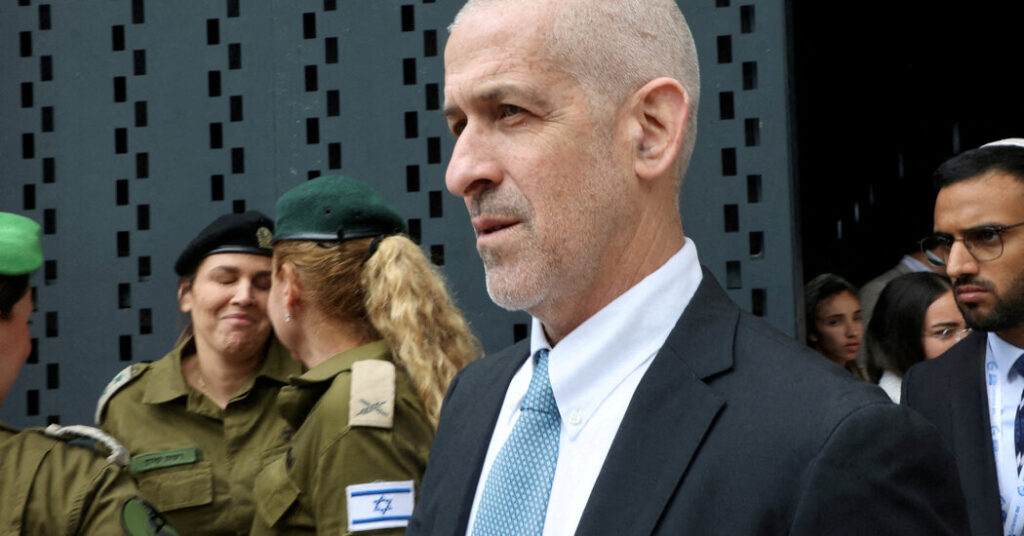The head of Israel’s domestic intelligence service announced on Monday that he would step down in June, appearing to end an unusually public and bitter clash with Prime Minister Benjamin Netanyahu that has roiled the country.
Mr. Netanyahu had fired Ronen Bar, who led the Shin Bet agency, in mid-March. The dismissal ignited an immediate public backlash: it came as Shin Bet investigators were scrutinizing Mr. Netanyahu’s aides for potential impropriety in their dealings with the Gulf state of Qatar.
Critics of Mr. Netanyahu saw Mr. Bar’s firing as an attempt to consolidate control over the agency or even muzzle the investigation into his advisers. Mr. Netanyahu is already standing trial for corruption in multiple cases; he denies any wrongdoing.
Mr. Bar had been expected to fight Mr. Netanyahu in the courts over his dismissal. Israel’s Supreme Court quickly suspended his firing. The two men have leveled grave accusations at one another in signed affidavits.
But on Monday night, Mr. Bar told Shin Bet officers, during a speech at the agency’s headquarters, that he would resign on Jun. 15. He said he hoped the Supreme Court justices would still rule on the case in a manner that preserves “the independence of future heads of the Shin Bet.”
The case epitomized a long-running domestic crisis that pits Mr. Netanyahu’s hard-line, right-wing supporters against more liberal Israelis concerned over the balance of power between the branches of government and the character of Israeli democracy.
In sworn testimony, Mr. Bar said Mr. Netanyahu had pressed him to spy on anti-government demonstrators, and had tried to secure the security chief’s backing for delaying Mr. Netanyahu’s testimony in his own corruption trial.
Mr. Bar also said that Mr. Netanyahu had indicated that he expected the Shin Bet to obey him, rather than the Supreme Court, in the event of a crisis between the branches of Israel’s government.
In a separate affidavit, Mr. Netanyahu rejected Mr. Bar’s accusations.
The Israeli prime minister’s office declined to comment on Monday’s developments.
A career intelligence officer, Mr. Bar assumed his position at the pinnacle of the Shin Bet in 2021. Two years later, Hamas launched a surprise attack on southern Israel that ignited the war. The attack that day killed about 1,200 people in Israel, mostly civilians, and saw 250 people taken hostage to Gaza. The subsequent Israeli military campaign left more than 50,000 Palestinians dead, according to Gaza health officials.
As head of the Shin Bet, Mr. Bar has played a key role in Israel’s war against Hamas in Gaza. His agency also helps oversee the decades-long Israeli military occupation of the West Bank, where millions of Palestinians live under Israeli control.
The failure to prevent Hamas’s assault — the deadliest day in Israeli history — hangs heavy over the legacy of all of Israel’s leaders at the time, including Mr. Bar. As the war in Gaza has dragged on, at least some have begun to resign; Mr. Bar said he, too, would bow out at an appropriate time.
Mr. Netanyahu has generally avoided publicly admitting fault for the strategy that enabled Hamas to grow strong enough to stage such an ambitious attack. He has occasionally tried to shift responsibility to security officials like Mr. Bar, accusing them of providing him with poor counsel.
In his affidavit, Mr. Netanyahu contended that he lost confidence in Mr. Bar during the devastating Hamas-led attacks, blaming him for not foreseeing it.
Mr. Bar argued that Mr. Netanyahu’s desire to fire him began after a series of moves in late 2024 and early 2025, including his decision to investigate Netanyahu aides suspected of security breaches in cases involving classified documents leaks, along with improper ties to Qatar.
Isabel Kershner and Johnatan Reiss contributed reporting.



